|
|
|
Sort Order |
|
|
|
Items / Page
|
|
|
|
|
|
|
| Srl | Item |
| 1 |
ID:
187047
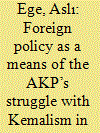

|
|
|
|
|
| Summary/Abstract |
This article provides analyses as to how foreign policy affects domestic politics, in particular the AKP’s struggle with Kemalism. It examines how Kemalism was delegitimized through the initial democratic, pro-European Union and pro-West discourse of the AKP. It then analyzes Kemalism’s marginalization under the civilizational, neo-Ottoman discourse advanced by Ahmet Davutoğlu. Finally, it explores Kemalism’s alienation through the opposition CHP, which has been impacted by the neo-Ottoman discourse, as currently constructed. It concludes that the AKP’s struggle with Kemalism did not end even when it established control over the state and when the ideological Kemalist nation-state identity was replaced by a new content in the form of an Ottoman-Islamic civilization. The article relies on a method of interpretative analysis of the AKP and Kemalist movements.
|
|
|
|
|
|
|
|
|
|
|
|
|
|
|
|
| 2 |
ID:
192260
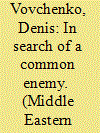

|
|
|
|
|
| Summary/Abstract |
The uneasy Putin-Erdogan partnership reminds of the early twentieth-century trends in the Russo-Turkish relations – taking advantage of each other’s dissidents vs cooperating against Western imperialism. Imperial Russia tended to indulge in the former which undermined the latter tendency in its policies in regards to the Young Turk regime who were similarly making irredentist overtures to Russian Muslim minorities. Both sides were also tempted or constrained by their existing or potential Great Power allies. In contrast, the partnership between the Soviets and Mustafa Kemal Ataturk would be more consistent as they minimized meddling in each other’s internal affairs to jointly oppose European encroachments. This article also shines a new archival light on the motivations of the Soviet side while highlighting the less well-known opposition to close cooperation between traditional rival empires on all levels of Soviet leadership. There is no scholarly work focusing on the 1908–1923 period in a single monograph or article (from the Young Turk revolution to the Lausanne negotiations). Looking at both sides of the 1917 divide reveals surprising continuity between the imperial and the Soviet policies despite the earthshattering effects of the First World War.
|
|
|
|
|
|
|
|
|
|
|
|
|
|
|
|
| 3 |
ID:
174158
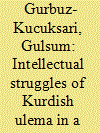

|
|
|
|
|
| Summary/Abstract |
Modern Kurdish thought encompasses many factions with diverse social, political, religious and ideological positions in and outside of Turkey.1 While our knowledge about the evolutions of the nationalist thought among Kurdish secular intellectuals has radically increased, the intellectual heritage of Kurdish religious intellectuals, the ulema, who have been searching for the best ways of delivering their societies from internal and external exploitations, have been mostly overlooked in Western academia. This article aims to bring to light the intellectual wrestling of a Kurdish mullah, Ali Zile of Diyarbakır, with the problems he believed Kurds faced from many angles: sheikhs, the passive madrasa tradition, the Kurdish secular/Marxist nationalism from the inside, and the Turkish nationalism and the Western imperialism from the outside.
|
|
|
|
|
|
|
|
|
|
|
|
|
|
|
|
| 4 |
ID:
067732
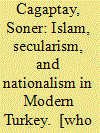

|
|
|
|
|
| Publication |
London, Routledge, 2006.
|
| Description |
xx, 262p.
|
| Series |
Routledge studies in Middle Eastern history; 4
|
| Standard Number |
0415384583
|
|
|
|
|
|
|
|
|
|
|
|
Copies: C:1/I:0,R:0,Q:0
Circulation
| Accession# | Call# | Current Location | Status | Policy | Location |
| 050717 | 305.8009561/GAP 050717 | Main | On Shelf | General | |
|
|
|
|
| 5 |
ID:
142294
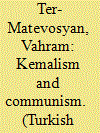

|
|
|
|
|
| Summary/Abstract |
Although scholars have examined different aspects of bilateral relations between Turkey and the Soviet Union, many aspects of the relationship remain to be studied and contextualized. This article examines how the Kemalist transformation in Turkey and particularly the ideology of Kemalism were seen and interpreted by Soviet actors between the 1920s and 1960s. Initially viewed as an ally in the struggle against the West, Kemalism was later treated mainly negatively by the Communist regime. However in the 1960s, with the rise of leftist politics in Turkey, the Soviets revisited Kemalism with more favorable interpretations. Looking at these shifts through the lenses of Soviet diplomats, Communist party functionaries, and scholars helps us to understand the underlying dynamics.
|
|
|
|
|
|
|
|
|
|
|
|
|
|
|
|
| 6 |
ID:
072182
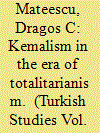

|
|
|
|
|
| Publication |
2006.
|
| Summary/Abstract |
The resurgence of interest in the concept of political religions and its various ideological and institutional facets gained a significant impetus with Emilio Gentile's contribution to the field. However, Gentile's conceptual construction has not yet been applied specifically to the study of Kemalism as the predominant doctrine of Turkey's transformation from an empire into a nation?state. This essay is based on the assumption that such an approach is possible and evaluates theoretically the applicability of Gentile's definitions of political religions and totalitarianism within the Turkish context of change as shaped under the principles of Kemalism in the first part of the 20th century.
|
|
|
|
|
|
|
|
|
|
|
|
|
|
|
|
| 7 |
ID:
187477
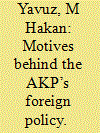

|
|
|
|
|
| Summary/Abstract |
This paper examines the role of ideas and identities in the making of the AKP’s foreign policy in Turkey. After briefly examining the institutional and international constraints on Turkish foreign policy before 2002, the discussion turns to the driving factors in three evolutionary stages of AKP’s foreign policy. It becomes apparent that a neo-Ottoman worldview and accompanying identity constitute the interpretive framework of the AKP’s political elite. The article traces how this worldview became dominant in Turkey’s policy making after the government dismantled the country’s Kemalist institutions and the AKP consolidated its political power.
|
|
|
|
|
|
|
|
|
|
|
|
|
|
|
|
| 8 |
ID:
103242


|
|
|
| 9 |
ID:
146770
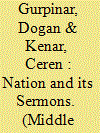

|
|
|
|
|
| Summary/Abstract |
This article will attempt to develop an in-depth examination of the pivotal role of Islam in the articulation of Turkish nationalism and Turkish official identity by examining the sermons authorized and imposed by the Presidency of Religious Affairs (PRA), the state agency regulating religion, and how the their cosmologies of social, moral and political order are entwined. We will further argue that this role involves a twofold process; firstly, the Muslim identity was imagined as a prerequisite for being considered as a Turk and a Turkish citizen and, secondly, the ‘cultural intimacy’ of Turkish nationalism is grounded on the ‘root paradigms’ inherited and attained from the Islamic tradition and theology. These arguments are particularly pertinent at a time when Islamist JDP (Justice and Development Party) consolidated its power and began to instrumentalize PRA for its priorities and visions of Islam. This, however, does not bring a radical reshuffling of PRA. On the contrary, the continuity from the Kemalist-monitored PRA to the JDP-monitored PRA can be attested not only in its organizational features but also in its ideological make up; especially in terms of its perceptions of society, state and social order.
|
|
|
|
|
|
|
|
|
|
|
|
|
|
|
|
| 10 |
ID:
135844
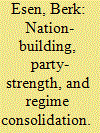

|
|
|
|
|
| Summary/Abstract |
Despite its waning influence, Kemalism remains a compelling topic within scholarship on Turkey. In recent years, for instance, a growing literature has critically examined the policies, arrangements, and institutions that underpinned the Kemalist single-party rule (1923–46). Although they have expanded our stock of knowledge on this period and pushed scholarly exchanges beyond polemical debates, most of these studies neglect to account systematically for the origins of the regime and assess it in light of other similar cases from the global south. To address such questions, this paper classifies Kemalism within a category of national-developmentalist regimes. The Turkish case differed from these cases, however, with its low level of institutionalization, particularly its ruling party's limited organizational and mobilizational capacity. While scholars tend to focus on the coercive aspects of Kemalist rule, in reality the regime was built upon a weak party apparatus, a factor that precluded the consolidation of the regime. This paper attributes such an outcome to two factors that gave Mustafa Kemal few incentives to build strong state and party institutions at the onset of his rule, namely (1) a low level of intra-elite conflict and (2) limited popular mobilization. Due to their limited base of support, the Kemalist leadership remained vulnerable to the defection of elites, who could mobilize the popular classes against the ruling party. This paper situates Kemalism as part of a broader category of reformist regimes in the developing world. In so doing, the paper carves out an analytical space wherein scholars can analyze Kemalism in comparative light and highlight the ways with which the Turkish experience differed from other similar cases in the global south.
|
|
|
|
|
|
|
|
|
|
|
|
|
|
|
|
| 11 |
ID:
080707


|
|
|
|
|
| Publication |
2008.
|
| Summary/Abstract |
Until the end of the twentieth century, Turkey's East-West paradigm found refuge in the ambiguous construct of Eurasia and was entrenched in an authoritative centralised state. With EU candidature and the radical reforms ushered in by the Islamist-based government, the Turkish Republic finds itself at its most critical juncture since its formation in 1923. In reviewinccg Turkey's reform process, the paper exposes the rifts in its dual Western-Anatolian personality, the ineptness of its Eurasia synthesis, the fragility of its special relationship with the United States and the inherent contradictions embedded in Kemalist statism. The paper argues that by seeking to join the EU, Turkey has also-inadvertently-embarked on a collision course with the Kemalist Devlet (state). The paper surveys the (European) fault line that currently divides Turkey, accentuating deep-seated dualisms-some dating to Ottoman times-that have been concealed by the Kemalist state. Finally, the paper argues that success (or failure) of the Euro-Turkish 'project' hinges on Turkey's capacity to reconcile itself with its suppressed historical past and radically reform the inherent contradictions of Kemalism-at the core of which is the military's inherent role as custodians of the Kemalist state.
|
|
|
|
|
|
|
|
|
|
|
|
|
|
|
|
| 12 |
ID:
159017
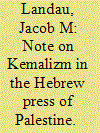

|
|
|
|
|
| Summary/Abstract |
The paper will attempt to examine the reactions of the Hebrew press to the Kemalist reforms and their importance for world civilization in general and Turkey's progress in particular. The newspapers wrote approvingly about the process of decision-making by the Kemalists who weighed carefully all options and then carried out all decisions firmly. The press emphasized what it considered Turkey's liberation from an Asiatic civilization and a theocratic regime via the establishment of a secular republic open to Europe and the West. The newspapers praised highly Turkey's drive towards modernization in its political, social and economic development. They were highly appreciative of the language reform and the purification of Turkish from Arabic and Persian loanwords – a process similar to what was going on then in modern Hebrew in Palestine. Some commended the well-organized introduction of the Latin script, an issue which was being debated then in Palestine (but with different results). They also praised the equalization in the status of women in Turkey.
|
|
|
|
|
|
|
|
|
|
|
|
|
|
|
|
| 13 |
ID:
120853


|
|
|
|
|
| Publication |
2013.
|
| Summary/Abstract |
This article probes the transformation of Kemalism to a xenophobic nation-statism with a strong anti-western animus diluting its self-styled westernism and elitism in response to the rise of the reformist-Islamist ruling JDP and its patchy liberal rhetoric and pro-EU stance. The article points to the novel qualities of the Kemalism of the 2000s but also attests to its inherent anti-elitist, anti-liberal and anti-intellectual nature that reigned in the 1930s given that the Kemalist project in the inter-war period involved the denunciation of the Ottoman establishment with its elite and intelligentsia and its replacement with an intelligentsia of its own that is acquainted with anti-liberalism, anti-cosmopolitism and also anti-intellectualism.
|
|
|
|
|
|
|
|
|
|
|
|
|
|
|
|
| 14 |
ID:
120374


|
|
|
|
|
| Publication |
2013.
|
| Summary/Abstract |
The recent literature on Muslim organisations in the Turkish diaspora context is voluminous as is analysis of Kurdish and Alevi grassroots politics against the Turkish state. Yet nothing has been written on those whose political orientation is in line with the secularist-nationalist ideology of the Turkish Republic, that is, of Kemalists. As a contribution to this endeavour, this paper explores Kemalist actors' mobilisation in Australia. The paper argues that their current activism is related to a threatened economic privilege, a loss of cultural capital and a waning political dominance in the ongoing social life of Turkey.
|
|
|
|
|
|
|
|
|
|
|
|
|
|
|
|
| 15 |
ID:
082131


|
|
|
|
|
| Publication |
2007.
|
| Summary/Abstract |
Most attempts to theorize religious resurgence rest on assumptions that reveal more about the social and cultural foundations of contemporary international relations than they do about the phenomenon under study. These assumptions encourage scholars to see religion as either an irrational force to be expelled from modern public life or as the foundation of entrenched competition between rival civilizations. I present an alternative theorization that identifies religious resurgence whenever authoritative secularist settlements of the relationship between religion and politics are challenged. Through a case study of the rise of Islamic political identity in Turkey, I show that the religious resurgence is neither epiphenomenal nor evidence of cultural incommensurability. It is instead a manifestation of attempts to reconfigure modern divisions between the sacred and the secu
|
|
|
|
|
|
|
|
|
|
|
|
|
|
|
|
| 16 |
ID:
121885


|
|
|
|
|
| Publication |
2013.
|
| Summary/Abstract |
This article critically engages with recent theoretical writing on the anthropology of secularism by way of studying the perceptions and consciousness of those whom I name 'militant laic actors' in Turkey. Beginning with their key conviction that the present Government of the Justice and Development Party (AKP) possesses a hidden mission to Islamize the country, I argue that rather than relating to the actual policies of the AKP, such a conviction reflects the mood and emotions of laic actors. This perception is not without a social context. It relates to both the enlarged political power of the AKP and to the relative thwarting of social agency experienced by militant laic actors. The paper concludes by noting certain insufficiencies in both Charles Taylor's and Talal Asad's work as frameworks for explaining the dynamics of secularism while making a case for the significance of the Turkish situation in contributing to wider debates in the anthropology of secularism.
|
|
|
|
|
|
|
|
|
|
|
|
|
|
|
|
| 17 |
ID:
107280
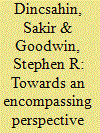

|
|
|
|
|
| Publication |
2011.
|
| Summary/Abstract |
This article focuses on the plight of the Jews in Turkey during the Second World War, with the intention of analysing specific historical events through the lenses of leading theories of nationalism. First we review recent developments in historiography that contribute the framework for understanding both the hermeneutical possibilities and limitations when addressing historical texts. Then we employ three theories of nationalism - the ethno-symbolist, instrumentalist and social constructivist - as a means of analysing and interpreting the historical events of the Jewish predicament vis-à-vis the Republic of Turkey. We conclude by suggesting what impact our findings may have on the narratives from this time period, and the way in which we can understand narratives today.
|
|
|
|
|
|
|
|
|
|
|
|
|
|
|
|
| 18 |
ID:
167598
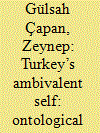

|
|
|
|
|
| Summary/Abstract |
This article aims to understand the ‘non-Western self’ and the different ways its ontological insecurity can manifest, through the example of Turkey, by contrasting Kemalism’s modernizing vision with Erdoğan’s current populism. We argue that the constructions of political narratives in Turkey (and by implication in other similar settings) derive from two interrelated aspects of the spatio-temporal hierarchies of (colonial) modernity: structural insecurity and temporal insecurity. Modern Turkey’s ontological insecurity was constructed spatially, on the one hand, as liminality and structural in-betweenness, and temporally, on the other, as lagging behind the modernization of the West. After discussing how Kemalism offered to deal with such insecurities in the twentieth century, we analyse the Justice and Development Party (AKP) period of the twenty-first century as an alternative attempted answer to these problems and explain why efforts to dismantle the Kemalist framework collapsed into its populist mirror image. The example of the Turkish case underlines the importance of focusing on the different ways in which the structural and temporal insecurities of ‘the non-Western self’ take shape at a given point and manner of entry into the modern international order.
|
|
|
|
|
|
|
|
|
|
|
|
|
|
|
|
| 19 |
ID:
084875


|
|
|
| 20 |
ID:
151856
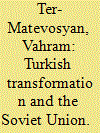

|
|
|
|
|
| Summary/Abstract |
Being founded in the wake of the First World War, both Turkey and the Soviet Union followed revolutionary modernizing pathways. At the outset, one could trace many similar patterns in their radical modernization paradigms; however, their development models as well as political and social orders were radically distinct, which became more obvious with the passage of time. The paper discusses the external interpretations of Kemalism by observing the Soviet perspectives on the inception and evolution of Kemalism. Paying more attention to diplomatic, geopolitical and economic complexities of the Turkish-Soviet relations, scholars have rarely problematized the Soviet Union perceptions of Turkish ideological transformations. In reality, since the early 1920s, different state institutions, intellectual schools of thought and research in the Soviet Union closely observed the domestic transformations in Turkey by providing valuable insights on the perspective and the implications of the Kemalist transformation. The article also looks at the question of how the incorporation of Soviet perspectives can enrich the historiography and our understanding of Kemalism.
|
|
|
|
|
|
|
|
|
|
|
|
|
|
|
|
|
|
|
|
|